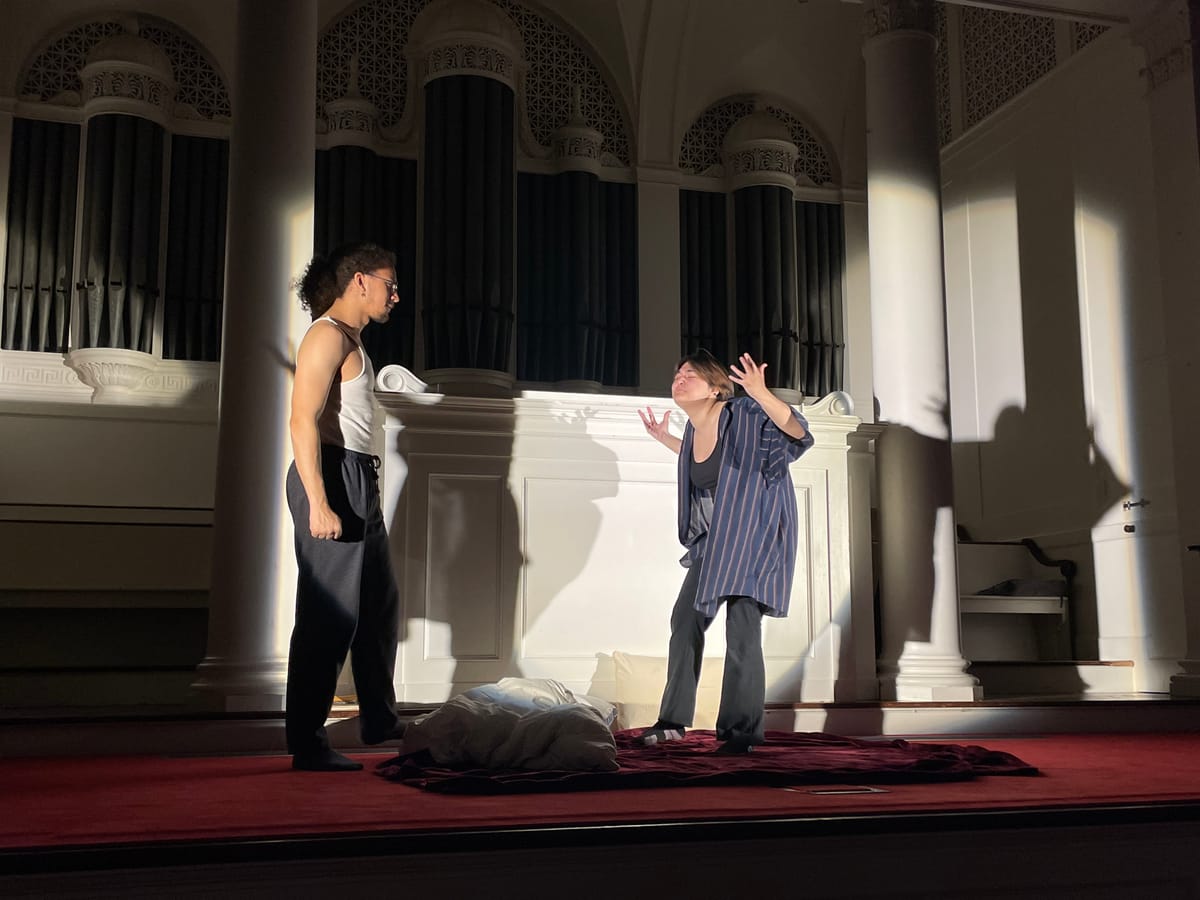Ten-Minute Play Festival Spotlights Student Theater
Green Room presented its Ten Minute Play Festival, celebrating student theater with four original plays. Managing Arts & Living Editor Alex Brandfonbrener ʼ23 gives his thoughts on the productions’ humor and whismy.

On March 24 and 25, the Amherst Green Room hosted its fourth annual Ten Minute Play Festival in Johnson Chapel, featuring four student-written plays chosen from over 20 submissions. The festival celebrates the writing, acting and directing of Amherst’s talented student theater community. I had the opportunity to attend a dress rehearsal two days before opening night, and I was struck by the passion and commitment of the students involved.
After receiving the 20 play submissions, director of the festival Isabelle Anderson ’25 and the Green Room E-board were tasked with choosing the plays that would be performed. The process was completely anonymous, and they did not know who wrote each play. In previous years, the festival featured six plays, but this year there were only four. Anderson admitted to me that “there were only four shows because we had difficulty finding people to stage manage and direct... We would rather have four really well directed and stage-managed shows than overwork the productions.”
“But there were a lot of submissions that I would like to see submitted again next year,” she said. She told me that she was proud of the directors and stage managers — some of whom had never been involved in theater before — and hopes the event continues in future years.
First up was “The Great, Big Mammoth Caper,” written by Shay Hernandez ’23 and directed by Bek Herz ’25. Bickering friends turned partners-in-crime Charles (Austin Xiong ’23) and Mona (Taylor Brentjens ’26) are visitors to the illustrious Beneski Museum of Natural History. Soon their loosely-veiled intentions are revealed: They want to steal the prized skull of the mammoth Bebu and other goodies.
The play was chock full of Amherst campus culture jokes. The duo needs a student ID to break into the museum at night; they simply walk up to the audience and grab one from a backpack. Later, the alarms in the museum go off, but they are mistaken for the Jenkins Dormitory’s fire alarms. A lot of the fun of the play comes from the ridiculous circumstances of the plot. Charles sports an outspoken top hat, while Mona wears a steel wool wig with pink curlers. Perfect for a heist.
I also enjoyed the levity that Sadie (Zoe Callan ’25) brought to the performance. She is a Geology major who works security at Beneski and almost foils the scheme. But she isn’t the best at her job, more focused on her Paleontology exam than the robbers right behind her. As a result, Charles and Mona manage to tie her up and ball-gag her mouth in a complex moment of stage action.
Likewise, a highlight for me was the off-kilter physical humor. How often do I get to watch a thief struggle to wrench the tusks out of a mammoth skull? Or try to avoid triggering a pressure plate by replacing a meteorite with an equally weighted object? These moments of humor were contrasted by the occasional contemporary theme, such as colonial theft of ancestral items.
All that being said, I don’t think that the play was an all-around success. For a comedy performance, “The Great, Big Mammoth Caper” felt a little sparse, as if there could have been twice as many jokes. And the jokes that were there felt a little banal; I had to read into them a lot to find the humor. In this day and age of ubiquitous overstimulation, it takes a lot for comedy to be fully satisfying.
The tenor of the event switched from comedy to drama in “Atrophy,” written and directed by Bianca Sass ’23 and choreographed by Sydney Ireland ’23. Two lovers (Alfie Cooper ’26 and Kobe Thompson ’24) are committed partners, cuddling in bed and reading C. S. Lewis’s “The Chronicles of Narnia.” They decide to do some reminiscing — “I’m tired of hearing other people’s stories… Tell me something you miss” — in order to reignite the flickering coals of their romance.
But it turns out that “remembering” is hard work, involving muscles that must be exercised in order to stave off the titular “atrophy.” While Thompson’s character is initially resistant, Cooper’s character becomes fully immersed in nostalgia. They describe a childhood snow day with vivid detail, both celebrating the past and mourning its loss. The dialogue was accentuated by evocative choreography, and Cooper moves across the stage with wide sweeping arms, making snow angels in the air, transfixed.
But that sort of remembering can be compulsive too. When Thompson’s character recalls a community potluck after a hurricane, he overflows with details: his first taste of neapolitan ice cream, eating deviled eggs with olives in the middle and the intoxicating feeling of a first kiss. His ecstasy is interrupted by a startling fact: “I don’t remember her name… I don’t think I ever learned it.”
At the climax of the play, an alarming twist sneaks in. Turns out the lovers are reminiscing because they have been stuck inside for 12 years, after an ecological disaster has left the outdoors uninhabitable. All the things that they miss really are gone, and all they have left is each other… and Narnia. The longest of the four plays (by quite a bit), “Atrophy” soaked itself in the nostalgia of mourning things that can never return — and I felt fully immersed in that feeling.
Next was “Holistic Review,” written by Nathan Grove ’23 and directed by Erika Andrade ’25. The setting is “a legally indistinct liberal arts college,” where five admission counselors each give their pitches for who should be admitted: A picture-perfect student who name-drops a famous parent in the first line of the essay: rejected. A student that wrote their essay about using homophobic slurs: accepted, but only because the hockey coach put in a good word. And when an applicant is from Wyoming, they ecstatically chant, “50 STATES!”
As the play progresses, it settles on some puzzling conundrums. Should they accept a student who had to take medical leave for their OCD, but chose to write about climate change? Gina (Piper Mohring ’25) posits that climate change essays are impersonal, making for bad stories. If she really wanted to put her best foot forward, then she should have chosen the more compelling topic (or something like that). And what if two bassoon players apply to the same schools: Would all the Ivies choose the same one?
The dialogue was clear, active and energetic. Cory (Lily Brenner ’26) did a lot of the comedic heavy-lifting, and her over-the-top character was really fun to watch. I also liked Beth (Hunter Kloss ’25), who advocated for the students more than the others (but if an essay has “you’re” in place of “your”? — rejected).
At times, I felt like the play couldn’t decide if it was comedy or not. Maybe that was because the characters inhabited the full spectrum of seriousness, though. That being said, I still really enjoyed it.
Last up was “Last Laugh,” written by Luke Herzog ’24 and directed by Owen Gaydos ’25. Yorick (Clay Zachary ’23), the skull from “Hamlet” but still alive, is a court jester set to be executed for making fun of the king. The executioner Severin (Sebastian Paredes ’26) can’t understand why he did it.
“Routine ruins men like me…” admits Yorick, and the two set off against each other. “You called him fat!” “I called him rotund.” With a poetic and fluid Shakespeare-esque language, the back and forth kept me interested. Severin pushes Yorick to admit his shortcomings: “You were the second most powerful man in the castle…” And the twist early on that Severin is the executioner was satisfying, but I felt myself craving another twist at the end.
An undeniable highlight was Zachary’s performance. Even though Yorick was the one whose head was on the chopping block, he controlled the scene and kept it focused. And he maintained the tone needed to portray a man with his life on the line, particularly because the play ends with an execution onstage.
I did think that Severin might have been a little too chipper; he does kill people for a living, right? Still, “Last Laugh” felt balanced, and it rounded out the event. I left not wanting much more from these four productions.
For me, the Green Room Ten Minute Play festival was a breath of fresh air. These days, entertainment media competes for our attention through advertising and micromessaging, incessantly and expeditiously. And the messaging is full of token queer characters, stories that pass through corporate meeting rooms, and reboots everywhere. The space of student theater at Amherst feels a whole lot freer.




Comments ()